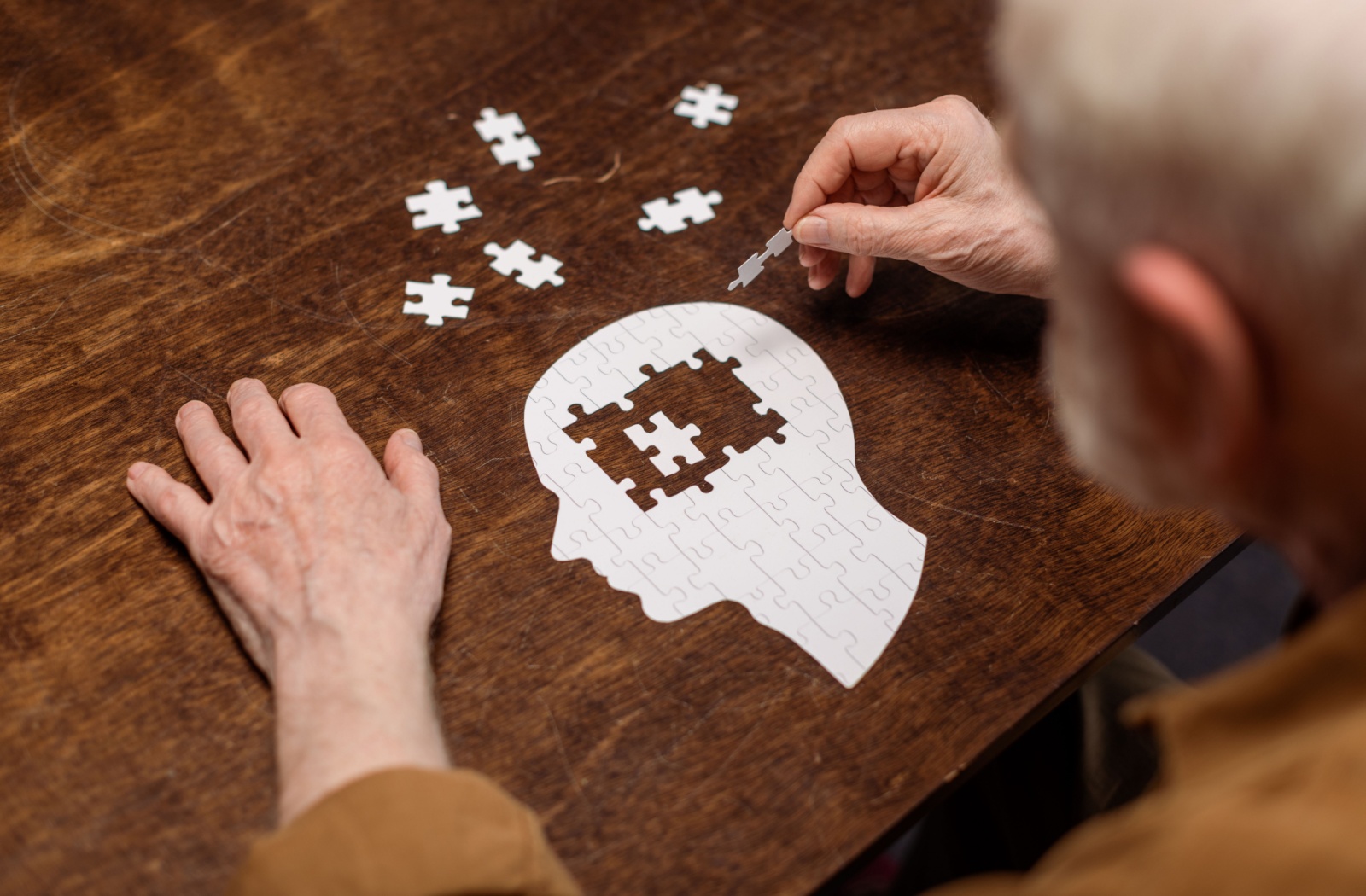Supporting a loved one with early signs of memory loss is rewarding and often manageable, but can also become challenging at times. As your loved one’s symptoms worsen, there may come a time when their well-being will benefit from ongoing professional care.
Signs to look out for that suggest a loved one may benefit from the support provided in memory care include:
- Behavioral changes
- Declining cognitive health
- Declining physical health
- Social withdrawal
Cognitive Decline & Memory Loss
Memory loss is an inability to recall past events, facts, or experiences. Although it’s common to occasionally forget things, especially as we age, consistent lapses in memory aren’t a normal part of growing older and may indicate a more serious concern. In particular, memory loss may be a sign of cognitive decline, a condition affecting the brain’s ability to process information, reason, and remember.
Cognitive decline goes beyond memory lapses. It also impacts functions like problem-solving, decision-making, and managing daily tasks. Symptoms include:
- Difficulty following conversations or instructions
- Trouble remembering recently learned information
- Confusion about places or times, such as forgetting a familiar route
- Withdrawal from family, friends, or hobbies
When memory loss begins affecting these areas of everyday living, a medical evaluation should be considered.
Signs It’s Time for Memory Care
Just because a loved one is experiencing early memory loss doesn’t necessarily mean that they currently require ongoing support. However, as their symptoms worsen, they may experience ongoing challenges with everyday tasks, making it more difficult for them to safely live independently.
Deciding when to transition to memory care involves evaluating your loved one’s safety and quality of life by looking out for changes in their behavior, cognitive and physical health, and social well-being.
Behavioral Changes
Cognitive decline impacts several areas of brain function, including a person’s behavior:
- Agitation or aggressiveness: An increase in frustration, agitation, or physical outbursts.
- Neglecting personal safety: Behaviors such as leaving the stove on, forgetting to take medications, or failing to recognize dangerous situations.
- Paranoia or suspicious thoughts: Experiencing heightened distrust of others, unfounded fears, or beliefs that others are taking advantage of them.
- Mood irritability: Increased irritability, frustration, or unpredictable mood changes.
Cognitive Health
Declining cognitive health affects your loved one’s safety, independence, and overall well-being, highlighting a need for care beyond what can be managed at home.
- Confusion and disorientation: If your loved one frequently becomes confused about time, place, or familiar tasks. This might include getting lost in familiar environments or forgetting significant details about their surroundings.
- Difficulty with communication: Having trouble finding the right words, repeating sentences, or withdrawing from conversations.
- Poor judgment: Making unsafe decisions, such as leaving the house in inappropriate clothing for the weather, giving away large sums of money, or falling for scams.
- Frequently misplacing items: Regularly losing possessions or placing them in unusual spots (e.g., putting keys in a freezer) may suggest worsening memory issues.

Physical Health
The interconnected nature of the brain and body explains why cognitive decline directly affects a person’s physical health.
The signs of cognitive decline reflect difficulties in daily functioning and personal care that affect your loved ones’ safety and overall well-being:
- Changes in mobility: Difficulty walking, increased unsteadiness, or frequent falls.
- Noticeable weight changes: Rapid weight loss or gain may indicate problems with maintaining proper eating habits or forgetting meals altogether.
- Frequent accidents: Difficulty performing tasks requiring fine motor skills or an increased frequency of minor injuries like cuts and bruises.
- Chronic fatigue: Ongoing exhaustion because of sleeplessness or irregular routines can weaken physical and mental resilience.
- Difficulty with personal care: Noticeable decline in clean clothing, hair care, nail hygiene, or overall appearance may point toward struggles with managing basic self-care responsibilities.
Social Well-being
Humans are hard-wired to value and seek out social connections. Cognitive decline disrupts social well-being by affecting a person’s ability to engage in meaningful interactions. Signs of reduced social well-being that may be a product of cognitive decline include:
- Isolation and loneliness: Withdrawing from friends and family or no longer engaging in activities that a person once enjoyed.
- Confusion in social settings: Struggling to follow conversations, forgetting the names of familiar people, or becoming disoriented in group gatherings.
- Difficulty maintaining relationships: Having trouble staying connected with loved ones due to memory issues like forgetting birthdays, missing calls, or failing to respond to loved ones’ messages.
- Unawareness of social norms: Forgetting basic manners or behaving in ways that seem inappropriate for a situation.
How Memory Care Supports Residents
Memory care is a specialized form of long-term care for people experiencing memory loss or other forms of cognitive decline like dementia or Alzheimer’s.
The resources in these communities cater to resident’s evolving care needs and unique challenges in a nurturing, safe, and supportive environment that includes:
- Professional care staff available 24/7 for assistance
- Personalized wellness and care plans
- Structured routines to promote familiarity, comfort, and cognitive engagement
- Meal plans tailored to nutritional needs and preferences
- Specialized therapies and activities to stimulate cognitive function
- Wide, well-lit hallways with mobile supports to prevent falls, injuries, and wandering
Memory care focuses entirely on addressing residents behavioral, cognitive, physical, and social needs through personalized care and activities:
- Cognitive well-being: Programs like art therapy, music sessions, puzzle activities, or reminiscence therapy are tailored to help residents exercise their minds while enjoying familiar and calming activities.
- Behavioral support: Memory care staff are trained to handle any behavioral challenges by encouraging stability, routine, comfort, and compassion.
- Physical well-being: We encourage residents to stay active through group activities such as yoga, walking groups, or dancing. On-site medical and care staff are available 24/7 to monitor health concerns and assist with medication management and physical therapy.
- Social fulfillment: We foster social interaction for residents through group activities, shared meals, celebrations, and common spaces to promote meaningful bonds with peers.
Schedule a Tour
Supporting a loved one with memory loss requires addressing their immediate needs and long-term well-being.
Recognizing early signs of worsening symptoms suggests your loved one will benefit from memory care’s personalized and professional approach to support. Connect with our team at All American Assisted Living at Wrentham to schedule a tour of our memory care community.



